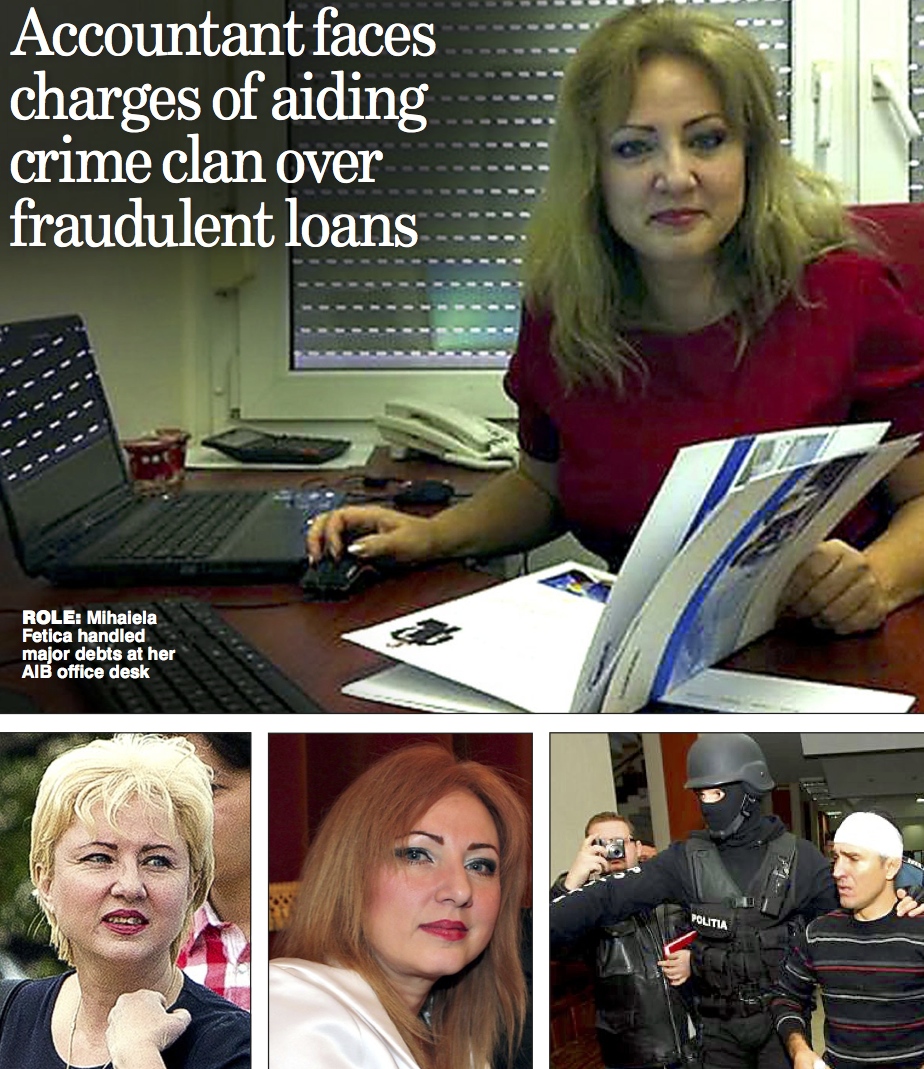By: Michael O’Farrell
Investigations Editor
AIB has fired a member of staff from its Ballsbridge HQ after confirming that she is being prosecuted in Romania as part of a massive loan scam investigation into a notorious mafia crime family.
Mihaiela Fetica, a specialist at AIB’s Financial Solution Group division, is one of 38 people charged with ‘deception, attempted deception and complicity to commit fraud in a case being brought by the Directorate for the Investigation of Organised Crime and Terrorism (DIICOT) in Romania.
She was hired by AIB in November 2013 on a six-month probationary basis even as the case against her in Romania continued.

Speaking to the Irish Mail on Sunday this week, Mrs Fetica and her husband Stefan confirmed she had been fired after a third party informed the bank of her history.
She insisted she is innocent of all charges but admitted she had not told the bank of the allegations against her when she was hired
‘No I didn’t tell them because I was very sure that the bank will be against hiring me,’ she said. ‘It’s a very good bank and there are very decent people there.
They don’t have any guilt – only me – because I was not honest because I was afraid.’ Under Central Bank rules all employees of regulated financial institutions must sign declarations of probity, and Mrs Fetica failed to declare the prosecution being taken against her in Romania. Because of this her contract was terminated on May 15, days before her probation was due to expire.
AIB’s Financial Solution Group was set up specifically in 2012 and is dedicated to working with customers with large legacy debts. As part of her work Mrs Fetica had access to the financial affairs of multiple millionaire businessmen.
‘There I had a computer – I had all the financial papers of all these millionaires – I met some of them. Brilliant people – very nice Irish businessmen,’ she said. ‘For example, one had €30m in loans from AIB and because of the financial crisis we were there to analyse and to try to help these people, but it was the decision of people above me to make approvals.’
Mrs Fetica said that during her employment with AIB she travelled home to Romania twice for court hearings. The case involves a long-running investigation into the Corduneanu clan, which is led by two brothers.
They run a multinational criminal network thought to span more than 30 countries.
The family has been involved in everything from human trafficking to drug smuggling. They are also believed to be linked to criminals in Ireland. But the Corduneanu clan is most renowned for organising a complex ring of credit fraud in which loans were obtained from banks by men specifically recruited and coached by the clan for this purpose.
These recruits – often homeless – were given makeovers, job contracts, payslips and everything else they needed to apply for a loan. Often they were positioned as employees of firms which were set up by the clan for this purpose. Contacts in banks and financial institutions, who were in on the act, ensured the loan applications went smoothly.
Mrs Fetica is being prosecuted because as an accountant for one of the clan’s firms (SC Big Security Europa Protguard SRL) she allegedly signed documents – contracts and pay slips – used to facilitate fraudulent loans.
She has also been accused of benefiting from some of the proceeds, something she denies. Details of her alleged role first emerged in 2010.
The MoS asked AIB whether it was concerned that an individual facing criminal charges had for a period had access to internal systems and whether any investigation had been launched.
The bank declined to comment.
* Additional reporting in Romania by investigative journalism NGO The Rise Project – www.riseproject.ro

